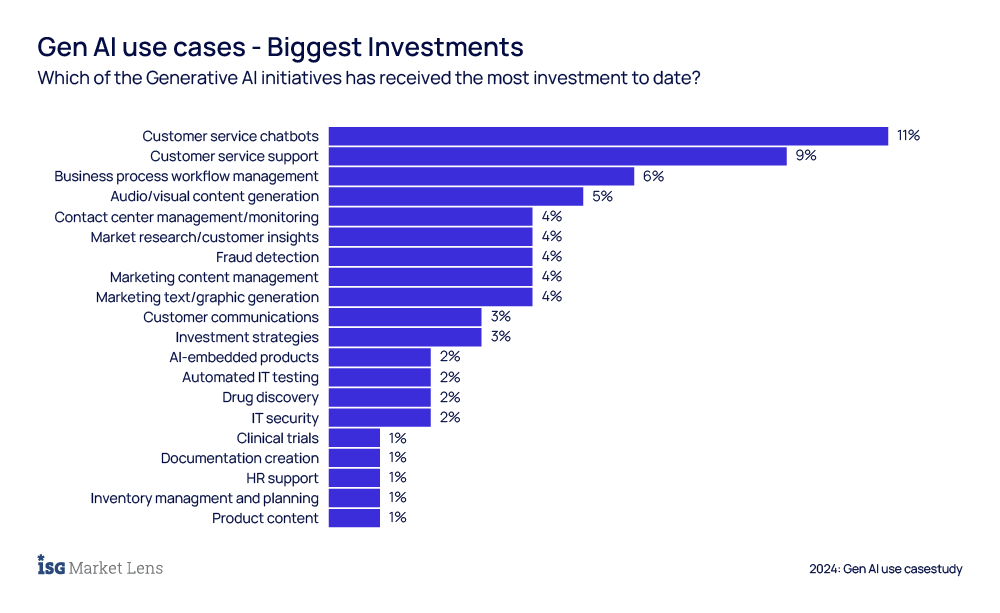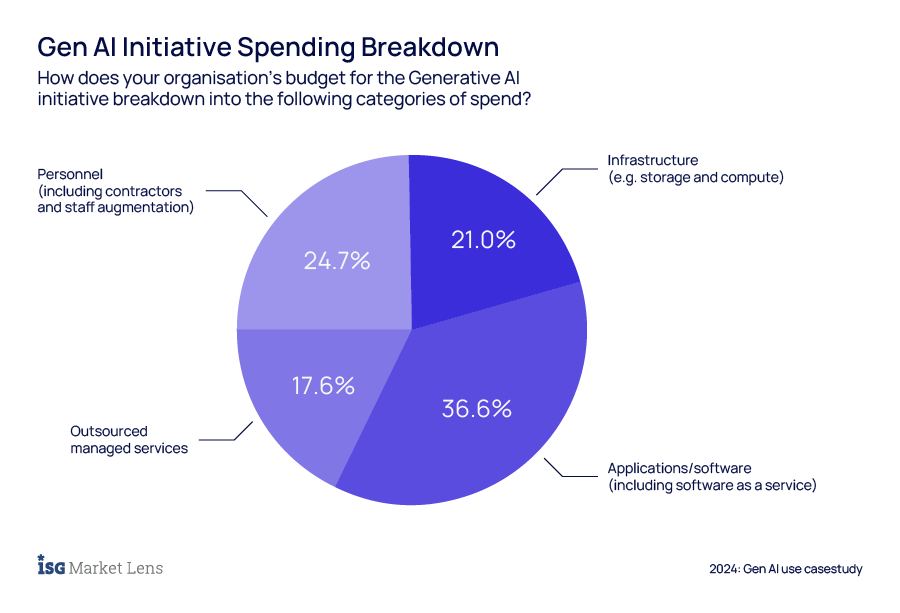Introduction
When artificial intelligence first started gaining attention, it felt like we were stepping into a new era. Today, AI plays a crucial role in our everyday lives, improving everything from personal tasks to business operations. The next big thing? Generative AI, which is changing how we create and interact with technology. Tools like ChatGPT, Google Gemini, and Microsoft Copilot are leading the way, allowing users to produce various types of content, such as articles, images, music, and even code. These tools can analyze information, spark ideas, help with communication, and solve complex problems. Generative AI marks an important step forward in artificial intelligence, making our interactions with technology more intuitive. As this technology develops, we see a shift from simple computing to systems that understand language and creativity. With Generative AI, organizations can:
- Find valuable insights in large amounts of data for better decision-making.
- Automate repetitive tasks to save time and effort.
- Create personalized content that connects with audiences.
- Develop new products and marketing strategies that improve customer experiences.
Generative AI use cases are driving innovation and delivering measurable ROI. According to the September 2024 ISG report, “State of the Generative AI Market”, enterprises are rapidly increasing their investments in GenAI initiatives, with spending expected to grow from 4.3% of IT budgets in 2024 to over 6.5% by 2025.
In this blog, we’ll explore the most impactful Generative AI use cases, highlight industry use cases for Generative AI, and examine the key investments and strategies required to ensure successful Generative AI implementation.
What Does the Rise of Generative AI Mean for Enterprises?
Unlike traditional AI systems that primarily analyze or classify existing data, generative AI actively produces original outputs that can be tailored to specific business needs. For enterprises, this capability opens unprecedented opportunities to innovate and streamline operations. It empowers organizations to automate creative and knowledge-intensive tasks, generate personalized customer interactions, and accelerate product and service development cycles. By harnessing generative AI, businesses can not only optimize costs and improve efficiency but also unlock new avenues for growth and competitive differentiation.
This foundational shift sets the stage for exploring the most impactful use cases where generative AI is driving business transformation across industries.
Decoding Generative AI for Enterprises
The adoption of Generative AI is accelerating across industries, with enterprises recognizing its potential to enhance efficiency, improve customer experiences, and unlock new revenue streams. The ISG report reveals that while only 10% of enterprise applications are currently GenAI-enabled, this number is expected to rise to 25% by the end of 2025.
This rapid GenAI adoption is fueled by the competitive advantage it offers. Businesses that embrace use cases for Generative AI early are better positioned to innovate, streamline operations, and meet evolving customer expectations.
Top Generative AI Use Cases Across Industries
Generative AI is making waves across sectors, with organizations investing heavily in applications that deliver tangible business value. The ISG report highlights the following top 20 examples of Generative AI use cases that are driving the most significant investments:

We will explore the top generative AI enterprise use cases in detail.
- Customer Service Chatbots and Customer Service Support.
Customer service remains the largest area of investment for Generative AI, with 20% of respondents (11% for chatbots and 9% for support) in the ISG study identifying it as their biggest focus area. AI-powered chatbots and support systems are revolutionizing how businesses interact with customers by automating responses, reducing wait times, and improving overall satisfaction.
For example, Hexaware developed a GenAI chatbot assistant for a leading insurance provider. This solution automated customer interactions, handling policy inquiries, claims processing, and support with remarkable efficiency. As a result, the chatbot reduced response times by 40% and significantly improved customer satisfaction scores, demonstrating the ROI potential of Generative AI in customer service. Read the full case study here.
- Business Process Workflow Management.
Generative AI is being used to optimize and automate complex workflows, enabling businesses to improve efficiency and reduce operational costs. By analyzing data and identifying bottlenecks, AI systems can recommend process improvements and even execute tasks autonomously.
Hexaware implemented an omnichannel contact center solution for a non-emergency medical transportation (NEMT) provider. This solution streamlined workflows across multiple channels, improving operational efficiency and enhancing customer experience. The AI-driven system allowed the client to manage high call volumes while maintaining service quality, showcasing how Generative AI can transform workflow management. Read the full case study here.
- Audio/Visual Content Generation.
Generative AI is enabling businesses to create high-quality audio and visual content at scale. From video editing to voice synthesis, these tools are being used in industries like media, entertainment, and marketing to produce engaging content faster and more cost-effectively.
For instance, Hexaware partnered with a North American airline to deploy a Generative AI solution for content marketing. The AI system created personalized marketing materials, including email campaigns and social media posts, reducing content production time by 50% and improving engagement rates. This project highlights how Generative AI can help businesses in the aviation and marketing industries achieve efficiency and better connect with their audiences. Read the full case study here.
- Contact Center Management/Monitoring.
Generative AI is transforming contact center operations by providing real-time monitoring, sentiment analysis, and agent assistance. These tools help improve the quality of customer interactions, reduce agent workload, and ensure compliance with service standards.
Hexaware revolutionized chat operations for a concierge services provider by implementing a Generative AI-powered solution. The system provided real-time monitoring and agent assistance, improving customer satisfaction and operational efficiency. This project demonstrates how Generative AI can enhance contact center management in industries that rely heavily on personalized customer interactions. Read the full case study here.
- Market Research/Customer Insights.
Generative AI is being used to analyze customer data and generate actionable insights for businesses. By identifying trends, preferences, and behaviors, AI systems help organizations make data-driven decisions and improve their marketing strategies.
For example, Hexaware built a digital experience platform for a global Formula 1 team. The platform leveraged Generative AI to analyze fan data and deliver personalized experiences, helping the team better understand their audience and improve engagement. This case study highlights how Generative AI can drive innovation in industries like sports and entertainment. Read the full case study here.
- Fraud Detection
To detect fraud, Generative AI leverages advanced data analysis to uncover hidden patterns and irregularities that signal potential anomalies. By applying machine learning algorithms, organizations can act swiftly to mitigate risks, enhancing security measures in sectors like finance, insurance, and e-commerce.
For instance, Hexaware partnered with a leading US-based credit union to modernize its outdated analytics systems, addressing the need for seamless data integration, enhanced fraud detection, and operational efficiency. This case study highlights how Generative AI can empower organizations with real-time fraud detection capabilities and a robust, scalable data platform to support future innovation. Read the full case study here.
- Marketing Content Management
Generative AI revolutionizes marketing content management by automating the creation and optimization of marketing materials. This technology streamlines workflows, allowing businesses to deliver personalized content across various channels while ensuring brand consistency. This ultimately drives higher engagement and conversion rates in today’s competitive landscape.
Hexaware partnered with a leading North American airline to enhance its website content and deliver an engaging user experience. This case study highlights how Generative AI can help organizations create original, high-quality content and optimize marketing strategies. Read the full case study here.
- Marketing Text/Graphic Generation
The ability to generate tailored marketing text and graphics swiftly is a game-changer for brands. With Generative AI, marketing teams can produce diverse creative assets that resonate with target audiences, adapting to trends and preferences in real-time. This innovation fosters deeper connections and significantly enhances customer engagement.
For example, Hexaware spearheaded the digital transformation of its client, a provider of equipment financing solutions for the commercial kitchen industry. This case highlights how Generative AI solutions can create engaging content and implement SEO strategies to boost search rankings. Read the full case study here.
- Customer Communications
Generative AI is transforming customer communications by enabling businesses to deliver highly personalized, timely, and consistent messaging across multiple channels. AI-driven communication platforms can draft, tailor, and automate responses for emails, SMS, and social media, ensuring that every customer interaction feels relevant and engaging. These systems leverage natural language processing to understand customer intent and sentiment, allowing organizations to proactively address concerns and foster stronger relationships.
For example, Hexaware implemented a Generative AI-powered omnichannel contact center suite for a concierge service provider. Generative AI, combined with enablers like a unified view and conversational AI, significantly enhanced customer communication operations, achieving a remarkable 99% SLA. Hexaware’s solution delivered faster resolutions, real-time efficiency, and higher first-time resolution (FTR) rates by shifting 85% of interactions from telephone to chat-based channels and reducing onboarding time by 30% through automation and quick routing. Read the full case study here.
- Investment Strategies
Generative AI is revolutionizing investment strategies by analyzing vast datasets, identifying market trends, and generating actionable insights for portfolio management. AI-powered platforms can simulate market scenarios, forecast asset performance, and recommend optimal investment allocations based on real-time data. This empowers financial institutions and individual investors to make more informed, data-driven decisions while minimizing risk.
Hexaware partnered with a leading wealth management firm to deploy AI-driven solutions that transformed the client experience through digital onboarding. The solution provided flexible web-based management reporting, consolidated multiple systems into a single portfolio accounting platform, and delivered integrated portfolio management tools for trading, investment, and reporting. Key outcomes included cost reduction, increased profitability, and automated workflows, with 350+ feeds and reports scheduled daily, automation of 50+ STP feeds to FIS, and 22 vendor feed automations. Read the full case study here.
The examples above demonstrate the versatility and impact of GenAI use cases across industries. From enhancing customer service to streamlining workflows, creating engaging content, optimizing contact center operations, and generating actionable insights, Generative AI is transforming how businesses operate. These cases are not just theoretical—they are delivering measurable ROI and helping enterprises stay competitive in a rapidly evolving market.
The Investment Behind the Innovation
Implementing Generative AI successfully requires thoughtful planning and resource allocation. According to the ISG report, organizations are dedicating substantial portions of their IT budgets to GenAI initiatives, with investments distributed across four key areas. Here’s how businesses are allocating their resources to support effective Generative AI implementation:

Applications and Software
The largest share of GenAI spending—36.6%—is allocated to applications and software, including Software as a Service (SaaS) platforms. Organizations prioritize proven off-the-shelf solutions to quickly introduce Generative AI capabilities into their workflows. These platforms provide cost-effective and scalable tools for use cases like chatbots, content generation, and analytics.
In addition to off-the-shelf solutions, many enterprises invest in custom-built tools to meet their specific needs and differentiate themselves from competitors. This balance between pre-built solutions and custom development ensures flexibility while enabling businesses to innovate faster and more effectively.
Personnel
Personnel costs, including staff augmentation and contractors, account for 24.7% of GenAI budgets. This reflects the emphasis on building a skilled workforce for Generative AI implementation. Many enterprises are upskilling their internal teams and hiring AI engineers, data scientists, and governance specialists to lead their initiatives.
The ISG report also highlights that external expertise is often leveraged, especially in the early stages of adoption. Contractors and consultants are brought in to fill skill gaps, accelerate implementation, and guide organizations as they develop their internal capabilities.
Infrastructure
Infrastructure spending represents 21% of the GenAI budget and includes investments in storage, compute power, and cloud platforms. Generative AI applications, particularly those involving large language models or real-time analytics, require significant computational resources to handle complex workloads.
Cloud-based infrastructure is a popular choice, offering scalability and flexibility to meet organizations’ demands as they scale their GenAI initiatives. By investing in robust infrastructure, businesses ensure that their AI systems can operate efficiently and deliver consistent performance.
Outsourced Managed Services
Outsourced managed services account for 17.6% of GenAI budgets, highlighting the importance of external expertise in accelerating GenAI initiatives. According to the ISG report, nearly two-thirds of enterprises rely on Managed Service Providers (MSPs) to support their most significant Generative AI projects. Outsourcing critical tasks, such as data preparation, AI governance, and application maintenance, allows organizations to access top-tier expertise and reduce the risk of failure.
This reliance is especially prevalent in industries where in-house AI capabilities are still maturing. MSPs not only help fill skill gaps but also enable businesses to achieve faster time-to-value while focusing their internal resources on strategic priorities. By leveraging MSPs, organizations can scale their Generative AI implementation more effectively and ensure their initiatives are aligned with business objectives.
Lessons Learned and Future Outlook
As businesses continue to invest in GenAI initiatives, several lessons have emerged:
- Start Early and Learn Fast: Many enterprises wish they had started their GenAI initiatives sooner to gain a competitive advantage and learn from early mistakes. Starting early allows businesses to iterate faster and refine their use cases.
- Leverage External Expertise: Partnering with MSPs or external consultants like Hexaware is key to overcoming skill gaps, especially during the pilot and early production phases. External expertise can accelerate implementation and reduce the risk of failure.
- Focus on Governance and Collaboration: Successful Generative AI implementation requires robust governance frameworks and cross-functional collaboration. This ensures compliance, mitigates risks, and maximizes ROI.
Looking ahead, the focus will remain on customer-facing applications and operational efficiency. The ISG report predicts that industry use cases for Generative AI will continue to expand, with businesses prioritizing applications that deliver measurable benefits.
Conclusion:
Generative AI is revolutionizing industries, offering unprecedented opportunities for innovation and growth. By exploring use cases for Generative AI and investing strategically in GenAI initiatives, businesses can unlock new possibilities and stay ahead of the competition.
At Hexaware, we specialize in helping organizations navigate the complexities of Generative AI implementation through our specialized generative AI consulting. Our specialized generative AI services include streamlining product descriptions to boost SEO and engagement, enhancing IT operations for faster and more accurate responses, and leveraging data analytics for personalized customer experiences. We emphasize responsible AI practices embedded from development through deployment, ensuring ethical, efficient, and measurable business outcomes. Our dedicated generative AI consulting practice further supports enterprises in navigating AI adoption with customized tools, blueprints, and strategies that accelerate digital transformation and innovation. Contact us today to learn how we can support your journey toward AI-driven transformation.



















